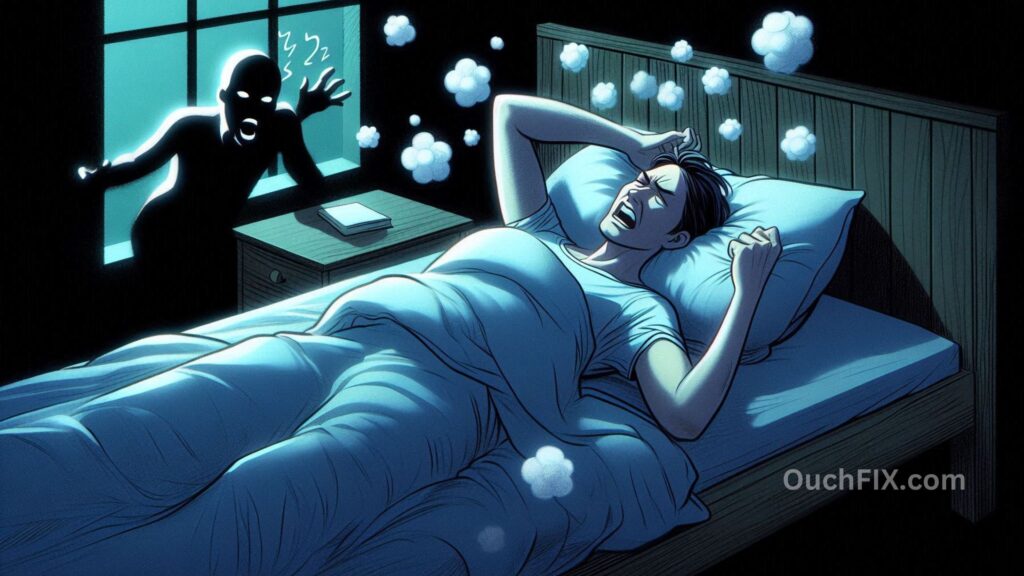Living with chronic pain isn’t just about dealing with aches during the day—it often follows you into the night, making restful sleep feel impossible. What many people don’t realize is that pain and sleep are closely connected. A good night’s rest can actually make pain more manageable, while poor sleep can make it worse.
In this guide, we’ll explore how chronic pain affects sleep, why quality rest matters for pain management, and practical tips you can use to sleep better despite the discomfort.
What Is Pain?
Pain is your body’s built-in alarm system. It occurs when nerve receptors send warning signals to the brain, creating that uncomfortable sensation we all know.

There are two main types of pain:
- Acute pain – short-term pain caused by an injury or illness, such as a broken bone or post-surgery recovery. This type usually improves as your body heals.
- Chronic pain – long-term pain that persists for months or even years. Common examples include arthritis, fibromyalgia, migraines, or lower back pain.
How you experience pain depends on multiple factors—your overall health, mood, environment, and even stress levels. Unfortunately, pain often intensifies at night, making it hard to fall or stay asleep. Over time, this can lead to long-term sleep deprivation, which not only worsens pain but also affects your overall health.
👉 According to the U.S. National Institutes of Health (NIH), poor sleep can increase sensitivity to pain and lower your body’s ability to heal.tunately, when pain flares up at night, it often leads to restless sleep or even long-term sleep deprivation.

Also Read: How can Yoga Help in Maintaining Wellness and Reducing Aches?
How Chronic Pain Disrupts Sleep
Chronic pain can interfere with sleep in different ways depending on the condition:

- Pain worsens at night – Some conditions, such as arthritis or migraines, flare up more during nighttime hours.
- Uncomfortable sleeping positions – Lying down may put pressure on sensitive joints or muscles.
- Constant discomfort – For many people, pain never fades, making it nearly impossible to reach deep sleep.
Even external factors—like noisy hospital settings, an unsupportive mattress, or medication side effects—can compound sleep difficulties.
The biggest problem? Frequent awakenings. People with chronic pain often wake multiple times per night, which disrupts the body’s natural sleep cycle. Without enough deep sleep and REM sleep, you may wake up exhausted and groggy.
In addition, many chronic pain sufferers also deal with sleep disorders such as:
- Sleep apnea (breathing interruptions during sleep)
- Restless legs syndrome (RLS) (an uncontrollable urge to move your legs at night)
Combine that with the stress, anxiety, or depression that often comes with chronic pain, and sleep problems become even more challenging.
Finding the Right Sleeping Position for Pain Relief
Your sleeping position can either help reduce pain—or make it worse. The right setup often depends on where your pain is located:

- Lower back pain → Try sleeping on your back with a pillow under your knees, or on your side with a pillow between your legs.
- Joint pain (hips, knees, shoulders) → Sleeping on your side may worsen pain, so experiment with back sleeping and use supportive cushions.
- Neck pain → Use a pillow that keeps your neck aligned with your spine. Avoid overly high or flat pillows.
- Widespread nerve pain (e.g., multiple sclerosis) → You may need to change positions frequently to avoid numbness and tingling.
💡 Investing in a quality mattress and ergonomic pillows can make a huge difference. Memory foam mattresses, wedge pillows, and body pillows are popular choices among people with chronic pain.

Also Read: What Simple Daily Habits Improve Overall Wellness and Ease Pain?
The Link Between Sleep and Pain
Science shows that the relationship between sleep and pain goes both ways:

- Poor sleep increases pain sensitivity – Lack of rest lowers your pain threshold, making even mild discomfort feel worse.
- Good sleep reduces pain intensity – Quality rest helps regulate chemicals in the brain, such as melatonin, that influence how we perceive pain.
Research published in the journal Sleep Medicine Reviews found that sleep deprivation can increase inflammation in the body, weakening your ability to recover. On the flip side, getting enough restorative sleep can reduce pain over time.
Interestingly, studies also suggest:
- Younger adults tend to tolerate sleep disruptions better than older adults.
- Women may be more sensitive to pain caused by poor sleep than men.
Chronic Pain, Mental Health, and Sleep: A Vicious Cycle
Chronic pain, sleep issues, and mental health struggles are often intertwined. Many people with chronic pain also experience anxiety or depression, which can make sleep even harder to come by. This creates a Chronic pain doesn’t just affect the body—it often impacts mental health. Anxiety, depression, and stress are common among people with long-term pain, and these conditions can make sleep even harder to achieve.

Here’s how the cycle plays out:
- You’re in pain → You struggle to fall asleep.
- You wake up exhausted → Stress and anxiety increase.
- Stress makes your pain feel worse → The cycle repeats.
One major factor is catastrophizing—when you dwell on your pain and expect the worst. People who catastrophize tend to experience more severe pain, worse sleep, and higher rates of depression.
Breaking the cycle
One proven treatment is Cognitive Behavioral Therapy for Insomnia (CBT-I). This approach helps reframe negative thoughts about pain and sleep, making it easier to relax at night. Studies show CBT-I can significantly improve sleep quality in people with chronic pain.
Other strategies, such as mindfulness meditation, gentle yoga, and stress management techniques, can also help break the cycle.

Also Read: How do Meditation Techniques Contribute to Pain Relief?
Tips for Sleeping Better With Chronic Pain

While pain can make sleep difficult, you can improve your chances of a restful night by building healthy sleep habits.
Practical tips for better sleep:
- Stick to a routine – Go to bed and wake up at the same time every day.
- Create a sleep-friendly environment – Keep your room dark, cool, and quiet. Consider blackout curtains, white noise machines, or earplugs.
- Invest in the right mattress & pillows – Look for options designed for pressure relief.
- Limit screen time before bed – Blue light from phones and tablets interferes with melatonin production.
- Avoid caffeine and alcohol late in the day – Both can disrupt deep sleep.
- Try relaxation techniques – Deep breathing, meditation, or a warm bath can ease muscle tension.
- Seek professional help if needed – If anxiety, depression, or insomnia persists, consult a therapist or sleep specialist.
Conclusion
Chronic pain and poor sleep often go hand-in-hand, creating a frustrating cycle that affects both physical and mental health. But the good news is that small changes—like finding the right sleeping position, creating a sleep-friendly environment, and managing stress—can make a real difference.
Prioritizing quality rest isn’t just about feeling less tired. It’s about reducing pain, improving mood, and boosting overall health. If sleep problems persist, don’t hesitate to seek professional support—because better sleep could be one of the most powerful tools in managing chronic pain.
FAQs About Sleep and Chronic Pain
Q1. Can improving sleep really reduce chronic pain?
Yes. Research shows that getting better sleep lowers pain sensitivity, reduces inflammation, and improves overall well-being.
Q2. What is the best mattress for chronic pain?
Memory foam or hybrid mattresses with pressure-relieving support are often recommended. The best option depends on your pain type and personal comfort.
Q3. Should I take pain medication before bed?
Always follow your doctor’s advice. Some medications may help you sleep, while others can interfere with rest.
Q4. How many hours of sleep do people with chronic pain need?
Most adults need 7–9 hours. With chronic pain, hitting the higher end of that range is especially important for recovery.
Q5. Can exercise improve sleep for chronic pain sufferers?
Yes. Gentle activities like walking, swimming, or yoga can reduce stiffness, ease pain, and promote better sleep—just avoid heavy workouts close to bedtime.




